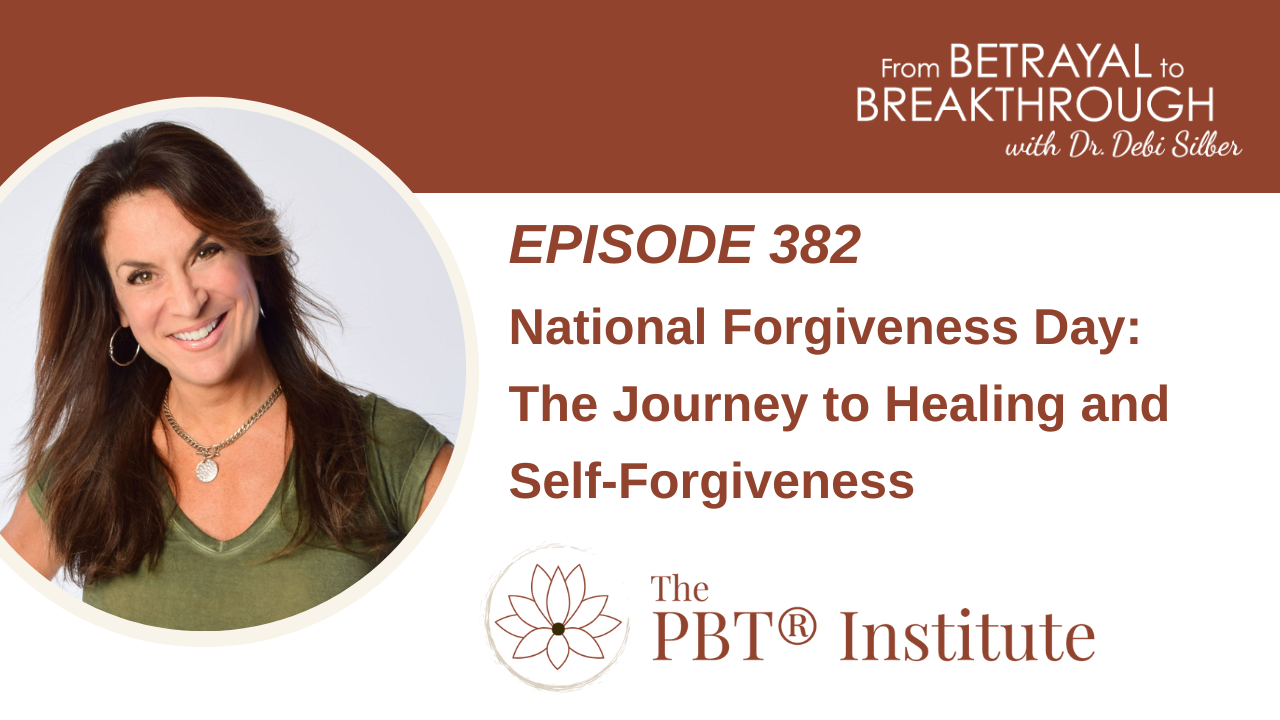
In this episode, we dive into the significance of National Forgiveness Day, a holiday founded on Sept. 1st by the PBT Institute. Dr. Debi discusses the complexities and challenges of forgiveness, especially in the context of betrayal, and offers insights and strategies for moving towards forgiveness and healing.
Key Points Covered
Introduction to National Forgiveness Day
- National Forgiveness Day was founded by the PBT Institute.
- The day emphasizes the importance and difficulty of forgiveness, both towards others and oneself.
The Challenge of Forgiveness
- Forgiveness can be particularly hard in situations of betrayal.
- Common reasons for the difficulty include societal pressure and personal emotions such as anger and resentment.
Research Insights
- Studies show that forgiveness leads to better emotional well-being when one feels safe and valued.
- Conversely, forgiveness can be detrimental when one does not feel safe or valued.
Rebuilding Trust
- Dr. Debi suggests replacing the concept of forgiveness with rebuilding trust in the early stages of healing.
- Rebuilding trust when feeling safe and valued can lead to better outcomes.
The Path to Forgiveness
- Acceptance is a more accessible first step than forgiveness.
- The emotional trajectory from sadness to anger, to pity, and finally to compassion.
- Forgiveness should be approached only when one is truly ready to avoid backfiring.
Self-Forgiveness
- It’s crucial to forgive oneself for being too hard during painful times.
- Self-forgiveness should follow genuine remorse, regret, and restitution.
The Impact of Unforgiveness
- Holding onto grudges can occupy mental space and hinder personal growth.
- Examples of situations requiring forgiveness: misdiagnoses, betrayal by colleagues, friends, or family members.
Health Benefits of Forgiveness
- Forgiveness can lead to significant physical and emotional healing.
- Example: A participant in a forgiveness journey healed from a 70-year digestive issue after two weeks.
The 21-Day Forgiveness Journey
- The host describes a 21-day forgiveness journey that includes daily stories, lessons, and practical exercises.
- Participants track their progress through a forgiveness tracker.
Success Stories
- Participants from the previous year experienced significant transformations and improved well-being.
- Many moved from initial resistance to forgiveness within the first week.
Invitation to Join the Journey
- Dr. Debi invites listeners to join the 21-day forgiveness journey starting from National Forgiveness Day on Sept. 1st.
- Different levels of involvement are available, including live sessions and replays.
- Special features include fireside chats for personal interaction and guidance.
Call to Action
- Visit nationalforgivenessday.com to sign up for the 21-day forgiveness journey that begins Sept. 1st.
- Choose a person or situation to forgive and join the journey to experience personal transformation and healing.
Conclusion
- Forgiveness is a powerful tool for personal growth and well-being.
- The host encourages listeners to take part in the journey and experience the profound impact of forgiveness.
Links Mentioned
National Forgiveness Day
The PBT Institute: Break free from the pain of betrayal and find safety, love, and trust again.
Subscribe and Review
Don’t forget to subscribe to the podcast and leave a review on your favorite podcast platform!
Next Episode Teaser
Stay tuned for our next episode, where we will explore the stages of healing from betrayal and more tips on building a resilient mindset.
